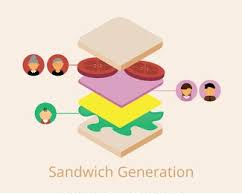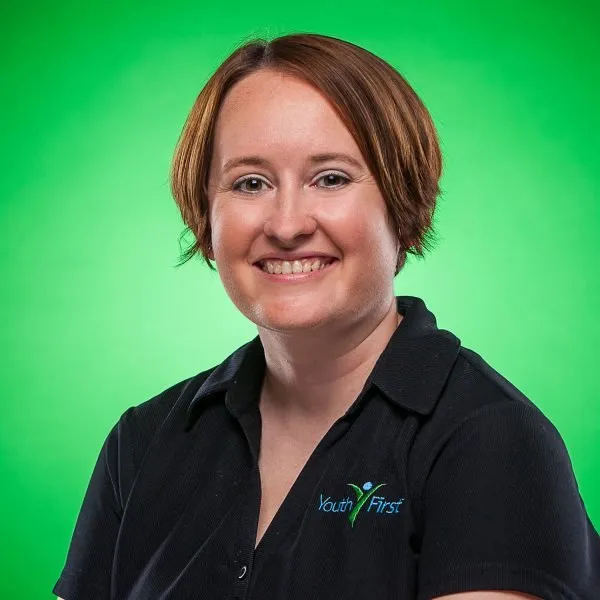
INDIANA – When I turned 40, someone told me that your forties are one of the most stressful times in your life. For many, your twenties and thirties often revolve around graduating from college, buying your first home, getting married, having kids, landing a good job, etc.

This means you and/or your friends are attending many celebratory events – bridal showers, housewarmings, baby showers, birthday parties, and enjoying all of those firsts. You are still spending a lot of time with friends and family.
Often when you enter your forties, you are raising kids who are still under the age of 18, working to earn a paycheck to support your family and paying bills (which include house and car payments, insurance, and daily living expenses), which often leads to less socializing and gathering with friends. To add to these responsibilities, sometimes individuals in their forties also have the added responsibility of taking care of their parents in one way or another.
This is where the “sandwich generation” comes into play. I personally did not know this was a thing, but I went to dear old Google to check it out.
According to an article from the Department of Psychiatry at the University of Michigan, the sandwich generation refers to a middle-aged group of Americans who serve as caregivers for both older and younger family members at once. The article states that there are over 2.5 million individuals who fit into the sandwich generation.

An article from USA Today stated that, “A growing share of the sandwich generation are millennials, adults born between 1981 and 1996.” An article in seniorliving.org pointed out that, “More than 50 percent of Americans in their forties are now taking care of both their children and senior parents.”
It is hard to juggle a full-time job and care for your children and aging parents. Essentially in one day, you could be transferring a parent into a nursing home, taking your teenager to get their license, attending a program for your preschooler, and trying to work eight hours at your job. This is stressful physically, emotionally, and financially.
An article written by Barbara Field on caregiver.org stated that with so many stressors, over 35 percent of caregivers experience feelings of depression. She noted that the sandwich generation can often experience:
- Caregiver burnout and feelings of guilt and isolation
- Excessive rumination about not being a good spouse, parent, or child due to limited time constraints
- Trouble juggling work, hobbies, relationships, and self-care
- Psychological challenges as they struggle with being pulled in multiple directions
I chose to write this article because before my dad passed away, I was part of the sandwich generation, and I have no doubt that with a 2-year-old and a teenager I will be part of it again.
The most important thing I learned so far on my journey is to ask for help, which is sometimes easier said than done. Your well is only so deep, and once it is depleted you are no help to anyone. Asking for help could mean finding someone else to transport your kids to practice or scouts. Ask your older kids and/or spouse to help out more around the house.
It could also mean talking to a therapist about your mental health or joining a support group. It might include saying a prayer and asking for guidance. Even just having a friend you can vent to can be helpful.
Here are some other tips to take care of yourself while you are busy taking care of others:
- Manage expectations, self-criticism, and perfectionist tendencies.
- Look for small wins — positive things that happened in the day.
- Make time for things you enjoy, whether it’s reading a book, taking a walk, or watching your favorite TV show
- Get plenty of sleep
- Pay attention to what you eat to fuel your body. If you are only eating drive-thru or gas station food, it will take a toll on your health.
The bottom line is to take care of yourself while you’re taking care of others. As the saying goes, “You can’t pour from an empty cup.” You’ll be a better caregiver if you take time to nourish your mind, body and soul first.

Amber Russell, MSW, LCSW, is a Youth First Mental Health Professional at Wood Memorial Primary, Wood Memorial Intermediate, Wood Memorial Middle School, and Wood Memorial High School in Gibson County. Youth First, Inc., is a nonprofit dedicated to strengthening youth and families. Youth First provides over 100 highly trained mental health professionals (primarily master’s level social workers), prevention programs, parent engagement coordinators, and bilingual support personnel to 126 schools across 14 Indiana counties. Over 53,000 youth and families per year are served by Youth First’s school-based social work and community programs that promote mental health, prevent substance misuse, and maximize student success. To learn more about Youth First, visit youthfirstinc.org or call 812-421-8336.








.png)











